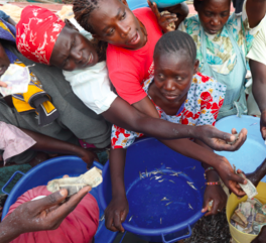How do gender approaches contribute to climate compatible development? Lessons from Kenya

Photo attributed to Dietmar Temps / Shutterstock.com. [Screenshot from report]
Posted by
Anna HickmanPublished
Abstract
This brief is based on a research project carried out by Practical Action Consulting with support from the Institute of Development Studies, commissioned by and supported by the Climate and Development Knowledge Network (CDKN), to provide evidence on the advantages and challenges of integrating a gender dimension into climate compatible development strategies in urban settings, with a focus on Peru, India and Kenya. Although considerable evidence exists pertaining to rural areas, significant knowledge gaps can be found in relation to climate compatible development and gender in urban areas.
The Kenyan case study examined the experiences of Kisumu, Kenya, drawing lessons from the five-year project ‘People’s Plans into Practice (PPP): Building Productive and Liveable Settlements with Slum Dwellers in Kisumu and Kitale’. The findings presented in this brief are based on interviews and focus group discussions held with key informants, as well as a review of relevant literature, policy documents and plans.